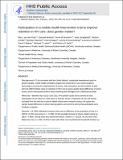| dc.description.abstract | Background
To be consistent with the United Nations’ sustainable development goals on gender equality, mobile health (mHealth) programmes should aim to use communications technology to promote the empowerment of women. We conducted a pre-trial analysis of data from the WelTel Retain study on retention in HIV care to assess gender-based differences in phone access, phone sharing and concerns about receiving text messages from a healthcare provider.
Methods
Between April 2013–June 2015, HIV-positive adults were screened for trial participation at two clinics in urban slums in Nairobi, Kenya. Proportions of men and women excluded from the trial due to phone-related criteria were compared using a chi-square test. Gender-based differences in phone sharing patterns and concerns among trial participants were similarly compared.
Results
Of 1068 individuals screened, there was no difference in the proportion of men (n = 39/378, 10.3%) and women (n = 71/690, 10.3%) excluded because of phone-related criteria (p-value = 0.989). Among those who shared their phone, women (n = 52/108, 48.1%) were more likely than men (n = 6/60, 10.0%) to share with other non-household and household members (p < 0.001). Few participants had concerns about receiving text messages from their healthcare provider; those with concerns were all women (n = 6/700).
Discussion
In this study, men and women were equally able to participate in a trial of an mHealth intervention. Equitable access in these urban slums may indicate the ‘gender digital divide’ is narrowing in some settings; however, gender-specific phone sharing patterns and concerns regarding privacy must be fully considered in the development and scale-up of mHealth programmes. | en_US |

